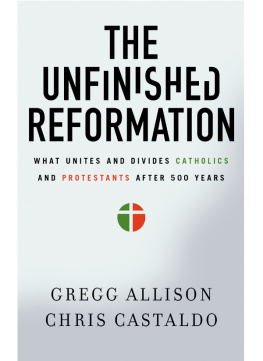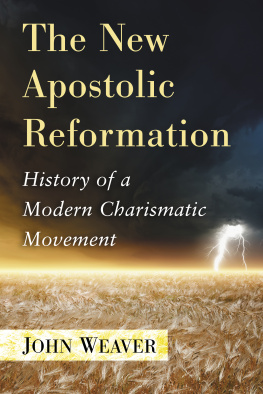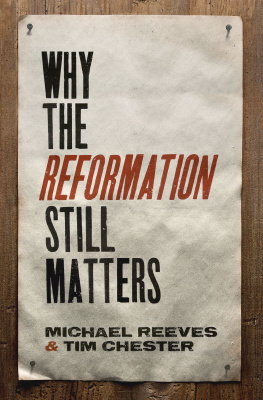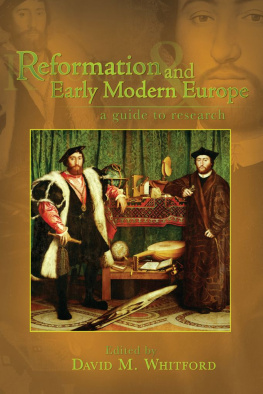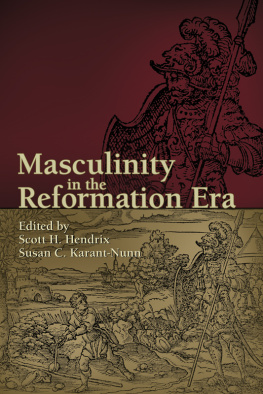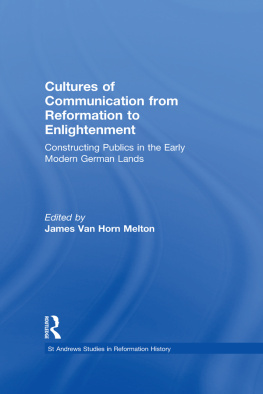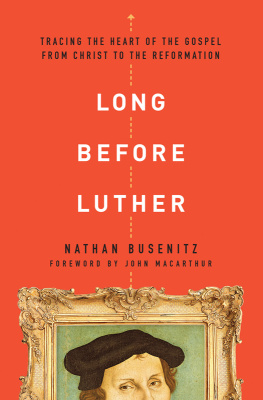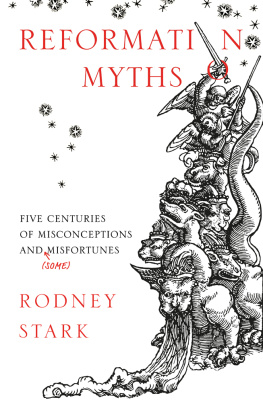The Early Reformation in Germany
The Early Reformation in Germany
Between Secular Impact and Radical Vision
TOM SCOTT
University of St Andrews, UK
First published 2013 by Ashgate Publishing
Published 2016 by Routledge
2 Park Square, Milton Park, Abingdon, Oxon OX14 4RN
711 Third Avenue, New York, NY 10017, USA
Routledge is an imprint of the Taylor & Francis Group, an informa business
Copyright Tom Scott 2013
Tom Scott has asserted his moral right under the Copyright, Designs and Patents Act, 1988, to be identified as the author of this work.
All rights reserved. No part of this book may be reprinted or reproduced or utilised in any form or by any electronic, mechanical, or other means, now known or hereafter invented, including photocopying and recording, or in any information storage or retrieval system, without permission in writing from the publishers.
Notice:
Product or corporate names may be trademarks or registered trademarks, and are used only for identification and explanation without intent to infringe.
British Library Cataloguing in Publication Data
Scott, Tom.
The Early Reformation in Germany: Between Secular Impact and Radical Vision. (St Andrews Studies in Reformation History)
1. Reformation Germany.
I. Title II. Series
274.306dc23
Library of Congress Cataloging-in-Publication Data
Scott, Tom, 1947
The Early Reformation in Germany: Between Secular Impact and Radical Vision / by Tom Scott.
pages cm. (St. Andrews Studies in Reformation History)
Includes index.
1. Reformation Germany. 2. Church history 16th century. I.Title.
BR309.S48 2014
ISBN 9781409468981 (hbk)
Contents
Acknowledgements
The following colleagues kindly offered information and advice in the preparation of this volume: Thomas A. Brady, Jr, Henry Cohn, Ulrich Ecker, Susan Karant-Nunn, Peter Matheson, and Hans Schadek. An especial vote of thanks must go to Siegfried Bruer in Berlin, who not only placed at my disposal the relevant section of his unpublished 1973 Diss. theol. relating to Johannes Agricola, but who was also a mine of information on church-state relations in the German Democratic Republic.
I am grateful for permission to republish to Oxford University Press, Oldenbourg Wissenschaftsverlag, Koninklijke Brill NV, and Dr Bridget Heal. In all other cases copyright rests with the author. Slips in the original essays have been silently corrected; the essays in any case are all revised and updated from first publication.
At an early stage Andrew Pettegree enthusiastically accepted these essays for publication in the St Andrews Studies in Reformation History series. To him and to the Reformation Studies Institute at St Andrews, to which I have been attached over the past decade, I am most grateful.
Langholm/St Andrews
TOM SCOTT
October 2012
Places of Original Publication
1. German History, 26 (2008), pp. 406-22; German History, 28 (2010), pp. 358-63. Oxford University Press.
2. Thomas A. Brady, Jr and Elisabeth Mller-Luckner (eds), Die deutsche Reformation zwischen Sptmittelalter und Frher Neuzeit (Schriften des Historischen Kollegs, Kolloquien 50) (Munich, 2001), pp. 173-202. Oldenbourg Wissenschaftsverlag.
3. Journal of Early Modern History, 6 (2002), pp. 265-95. Koninklijke Brill NV.
4. Angelika Westermann and Ekkehard Westermann (eds), Streik im Revier. Unruhe, Protest und Ausstand vom 8. bis zum 20. Jahrhundert (St Katharinen, 2007), pp. 137-52.
5. Archiv fr Reformationsgeschichte, 102 (2011), pp. 7-32.
6. Published here for the first time.
7. Published here for the first time.
8. Bridget Heal and Ole Peter Grell (eds), The Impact of the European Reformation. Princes, Clergy and People (Aldershot/Burlington, VT, 2008), pp. 15-36. Bridget Heal and Ole Peter Grell.
9. Published here for the first time.
10. Ian Breward (ed.), Reforming the Reformation. Essays in Honour of Principal Peter Matheson (Melbourne, 2004), pp. 114-24.
Introduction
The ten essays assembled here were all written over the last dozen years. They reflect my conviction that the early Reformation in Germany, far from being a worked-out seam of research, still contains new adits and shafts of exploration into unresolved questions. For most of the 1970s and 1980s interest centred on the impact of Luthers (or Zwinglis) message: its socially mediated and conditioned reception in town and country; the dissemination of that message through pamphlets and broadsheets, as well as printed books; and the wave of iconoclasm which swept over the German-speaking lands, as churches were desecrated, images destroyed or stolen, and, symbolically, much of the Catholic liturgy was rejected or scorned.
Over time it was predictable that historians interests would shift to later periods and other topics: the political and legal establishment of Protestant worship; the incorporation of the Lutheran (though not the Reformed) confession into the constitutional fabric of the Holy Roman Empire; and the training (and shortcomings) of a new Protestant clergy in spreading evangelical doctrines among a sometimes hesitant or recalcitrant laity. The triumphalist tenor of social history writing on the early Reformation gave way to scepticism and qualification. This revisionism, no doubt salutary, nevertheless suggested by implication that the agenda of the 1970s and 1980s could be laid ad acta: it had been accomplished.
Yet it is remarkable how many aspects of the early Reformation in Germany have received scanty or perfunctory treatment. Until very recently that was true of the links between the imperial reform movement of the fifteenth century and the Reformers own concern for an amelioration of the Christian Estate (as Luther put it), that is, embracing both church and society. There are still those, chiefly church historians, who argue that Luthers interest in Social and economic questions was tangential or transient, or that the primacy of his theological vision precluded any detailed concern for, or knowledge of, the social issues of his day. I believe this view to be profoundly mistaken.
By the same token, interest in the German Peasants War has dwindled to vanishing-point, as if Peter Blickles overarching thesis of the War as a revolution of the common man had carried the day. Yet it was variously challenged at the time and still presents unresolved conceptual and methodological difficulties. It is striking, moreover, that historians of early modern Europe have hardly concerned themselves with the Peasants War,
The efflorescence of gender studies has also had its impact on Reformation history, but very little work has so far been undertaken on the impact of Reforming doctrines on women collectively: general surveys tend to regard the Reformation as a relegation of women, whether it be the discrediting of a specifically feminine religiosity or the propounding of a view of the family in which the wife was firmly subordinated to her husband, as the copious Hausvterliteratur suggests. If here be truth, then let us be mindful that this was the outcome of consolidation and the affirmation of social disciplining in general: it should not be taken as




